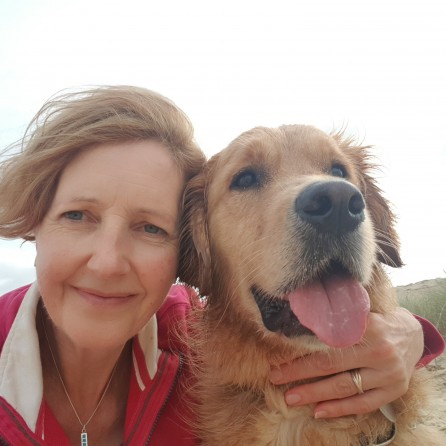
Sarah is an OMSer in France and she shares how Pilates have helped her through her journey with MS.
When I was diagnosed with RRMS in May of 2013, I was teaching Pilates near Toulouse in France, where I had lived since 2006. I was living what I thought was a healthy lifestyle; I had followed a vegetarian diet for about 25 years, and in addition to my own Pilates practice I walked my dog every day and cycled several times a week. I basically enjoyed an active outdoors lifestyle in the south west of France.
All that changed in January 2013, when I had my first and for the moment only episode of MS.
During the previous year I had experienced a few episodes of vertigo, I’d also noticed that I was occasionally a bit clumsy.
Whilst I was teaching one of my group classes, I was experiencing vertigo when I tried to do certain movements. Then on my drive back home, I was finding it increasingly difficult to focus properly. Once home, my head was spinning, and I could hardly stand up. When I saw my GP later that afternoon, he referred me straight away to another specialist that same evening, but due to bad traffic we were late, and the specialist had already gone home. The following morning, I was even more dizzy and nauseous, so we went to A & E. As soon as the triage nurse saw me, she put me in a wheelchair and took me straight through where I was seen by a neurologist who immediately admitted me to what ended up being a week’s stay in hospital.
During that week, I was subjected to scans, an MRI, a lumbar puncture, blood tests etc. The whole experience was frightening, being my first stay in hospital and not knowing what was wrong with me. I was never ill and had never had to take a day off from illness before. When I finally got one of the neurologists to tell me what they thought was the matter with me, multiple sclerosis was mentioned as one of the possible causes. Once, I’d understood that ‘Sclérose en plaques” was MS, I was in a complete state of shock. My husband started doing lots of research on the internet. I would have too, except by now I also had double vision and was finding it difficult to read. He came across the Overcoming MS website and told me about their recovery program. I also found out about a Pilates teacher, Mariska Breland, from Washington who had MS and was developing a Pilates-based exercise programme for MS.
I had already been doing some basic standing Pilates exercises in hospital, holding onto the end of the bed for support, and hearing about Mariska encouraged me to persevere. It wasn’t very much, but at least I felt that I was doing something to help myself and to be honest there wasn’t much else to do, I couldn’t lie down without feeling dizzy and I couldn’t read.
Once I was back home, I continued with my exercises. My sons helped me walk down the garden to my home Pilates Studio. Here, I would do seated and standing exercises. I modified traditional Pilates exercises to improve my balance and strength, which were becoming noticeably better. Not only this, I felt more positive that whatever the diagnosis, recovery was possible. By April, I was able to resume my Pilates teaching.
My official MS diagnosis came after another MRI in May, and even though it wasn’t unexpected, the news was still a shock. By now, my sight had improved, and I had read the Overcoming MS book, and adopted the program straightaway.
Modifying my diet was not as hard as I thought it might be, and I resumed my active lifestyle. For me the area of the program that I found most difficult was meditation. Pilates is often described as “Meditation in Movement”, and with its underlying principles of “concentration”, “breathing”, “control” and “precision”, I believe that this is true. When I practice Pilates, I find that I can forget about everything else and focus solely on the movement and my body. I nevertheless continue to practice meditation, but now my early morning daily routine consists of 10 minutes of meditation followed by 10-20 minutes of easy Pilates. In general, I will do a longer, harder Pilates session 3 to 4 times a week.
I believe Pilates not only helps achieve the meditation part of the OMS program, but at the same time satisfies the exercise component. In November 2014, I was able to attend a Pilates training course specifically for MS run by Mariska Breland. Pilates has the potential to improve strength, posture and gait as well as helping with the neuroplasticity aspects of MS. It really is a complete mind – body exercise, and for me, incorporating it into the OMS 7 step program has been a crucial part of my journey back to even better health.